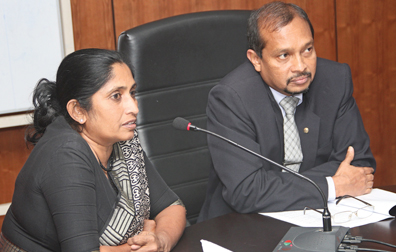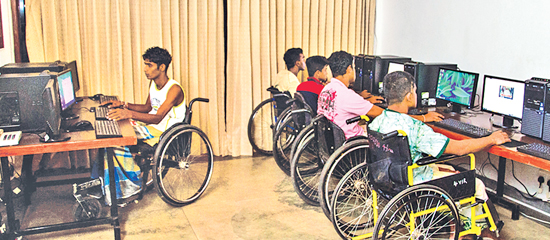So that they are not ignored
Defence Ministry to launch Virusara card with social
welfare package for war heroes and their families:
by Dhaneshi Yatawara
The Ranaviru Seva Authority(RSA) will on January 25 launch the
Virusara card to assist war heroes and their families. This will provide
beneficiaries better access to many products and services at discount
prices from State and private sector entities, including scholarships,
tangible discounts on products and services, priority on services and
other facilities.
 |
|
Secretary to the State
Ministry of Defence A.P.G. Kithsiri and acting chairman of the
Ranaviru Seva Authority, Upulangani Malagamuwa addresses the
press conference at the launch of the Virusara card. |
Currently, 45 corporate sector entities have pledged to support the
project. The partner firms include a number of leading conglomerates and
popular brands in both State and private sector industries offering
services in retail trade, travel and transport, education, insurance and
finance, medical and telecommunication facilities. To solve the
transport problem the war heroes and their families face, at least to
some extent, the National Transport Commission has agreed to issue
special passes for bus and railway transport.
Despite numerous welfare measures by the government and by
well-wishers, disabled soldiers face numerous challenges in their
day-to-day lives. Travelling for their daily needs, to the hospital,
banks from the village is invariably a hassle especially for those
living with their families.
The Ranaviru Seva Authority (RSA) has for over fifteen years extended
its services to war heroes, their families and young widows of soldiers
killed in action. “We cannot forget the fact that it was because of the
sacrifice of our war heroes that we have a peaceful and safe environment
today. Our future generation should know this as well,” Upulangani
Malagamuwa acting chairman of the RSA said.
“We need to show their wives, children and parents the development
path. They should be on par with the rest of the nation, when it is
moving towards a developed state. Hence we are spending heavily for
their benefit,” she said.
As some children were not fortunate to see their soldier fathers
alive when they were born, their mothers have a huge responsibility to
build a world for them, Malagamuwa said. There is a special allocation
in the Budget to help wives of war heroes who were now single parents.
Quick recognition
The Ministry of Defence has introduced the Virusara card, to
alleviate their woes, Secretary to the Ministry Karunasena Hettiarachchi
said last week. The State Minister of Defence handles the operation. The
card will be distributed through the RSA.
According to the Secretary to the State Minister of Defence, A.P.G.
Kithsiri, there were several requests from war heroes regarding
shortcomings in the welfare measures provided to them. To streamline the
support, the government decided to issue the ‘Virusaru’ card, he said.
The Card enables quick recognition and identification of war heroes
and their families numbering over 300,000.
State Minister of Defence Ruwan Wijewardene said the plight of
school-going children and spouses of these war heroes and those with
permanent disabilities, some of whom are in wellness, rehabilitation
centres or hospices for the rest of their lives, should not go unnoticed
as it is a moral obligation and a prime responsibility of the
government.
The war in Sri Lanka, for nearly three decades, had triggered
widespread psychological trauma among soldiers, where some were
constantly in the operational areas for over 10 years. The psychological
wounds of soldiers, were underestimated and it took many years for the
Sri Lankan authorities to recognise the impact of combat trauma,
especially the Post Traumatic Stress Disorder (PTSD). This is an
emotional, psychological and behavioral stress reaction among soldiers
and officers due to war.
 According to a research by Dr. Ruwan Jayatunge, based on rough
estimates, 8-12 percent of Sri Lankan combatants were suffering from
combat related PTSD. According to a research by Dr. Ruwan Jayatunge, based on rough
estimates, 8-12 percent of Sri Lankan combatants were suffering from
combat related PTSD.
Combat related PSTD
“Many victims experience intrusive thoughts, flashbacks, nightmares,
intense rage, apathy, cynicism, alienation, depression, mistrust and
reduced life interest,” he said stressing that these psychological scars
affect their daily lives making them dysfunctional and vulnerable. Dr.
Jayatunge, one of the pioneers in studying PTSD psycho-social effects,
has been working with Sri Lankan war veterans at all levels.
According to him, PTSD is a serious mental health problem among Sri
Lankan soldiers. Following a case study, Dr. Jayatunge, said a private
soldier, who was redeployed in the North after treatment for an injury
due to a blast
at the Thalladi camp in Mannar, was showing signs of PTSD. The
soldier’s intolerance to revisit the place, irritable nature and
uncontrollable anger were prominent. Several times he had been punished
by platoon leaders for disciplinary infraction.
The impact of fear, physiological arousal, horror, survival guilt and
hopelessness in combat cannot be underestimated, he said.
In his research on traumatic brain injury, Dr. Jayatunge, said in Sri
Lanka from 1983 to 2009, over 200,000 military personal were deployed in
operational areas and a considerable number sustained mild to severe
head injuries following enemy attack.
In his research conducted for seven months from August 2002, Dr.
Jayatunge found 29 military personnel with traumatic brain injuries from
the sample group of 824 Sri Lankan Army servicemen undergoing treatment
at the Psychiatric ward of the Colombo Military Hospital. The
categorisation was based on the diagnosis of the Consultant Psychiatrist
of the Sri Lanka Army. A significant number of combatants had post
traumatic reaction soon after traumatic combat. The majority went
undetected and untreated, according to Dr. Jayatunge. The RSA will open
a special centre to provide psychological treatment for affected war
heroes, said acting Chairperson Upulangani Malagamuwa. “We have
requested specialists and many have come forward. We need more
psychiatrists and psychologists,” she said.
For rehabilitation of the injured and disabled soldiers and officers,
the Ranaviru Seva Abhimansala 1,2,3 and Mihindu Seth Medura were set up.
The Sri Lanka Army Directorate of Rehabilitation said there were over
20,000 officers and soldiers at different levels were facing
disabilities and some were in service, while some had left the Army on
medical grounds. The Mihindu Seth Medura in Attidiya is dedicated to
paraplegic soldiers and officers.
Special treatment
Director of Rehabilitation of the Army Brigadier S. K. Thirunavukarsu
said some disabled soldiers in the Abhimasala welfare centres in
Anuradhapura, Pangolla and Kurunegala, had deployed soldiers to take
care of their peers. The Sri Lanka Army Seva Vanitha Unit and Regimental
Seva Vanitha Units were taking care of some aspects of the welfare of
these war heroes by providing houses and scholarships to their children.
Apart from routine, the Army in collaboration with the Department of
Vocational Training were providing vocational training to disabled
soldiers who wished to retire on medical grounds. Military personnel
retiring under normal circumstances could choose a vocational training
option of six months to one year.
“Most of them are recruited to companies during their internship,
which is part of the training program,” added Brig. Thirunavukarasu. The
major problem faced by officers and soldiers deployed in the frontlines
during the war was the lack of opportunity in further education and
qualify. When questioned as to whether there was any special system
introduced to support these officers and soldiers,i Military spokesman
Birg. Jayanath Jayaweera said it was decided by the selection board.
“Any officer or soldier could apply to follow suitable courses, but the
selection will be on the availability of vacancies in these courses,” he
said.
Be it counselling, psychological treatment or the urgent need of
logistic support, these men and their families still struggle to get on
with life. Therefore, paying attention to these men, widows and their
families is of utmost importance, before a social tragedy occurs, he
said.
|

